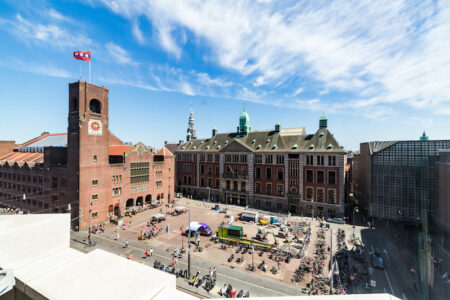Exclusive: Belgian market World Confectionery Conference focus

pic: Shutterstock
As this year’s World Confectionery Conference draws ever closer, food and drink journalist Dominique Huret offers an exclusive behind-the-scenes on the region’s confectionery sector
With major players, famous brands, myriad artisan producers, Belgium remains a focal place for chocolate – which forms a key part of the nation’s cultural heritage.
From coating and filling specialties to pralines and elaborate bars, all are produced in this tiny country located between much larger geographical neighbours.
Clearly, Belgium benefits from a unique position in the chocolate world, and its close association with the sector has gained it a global reputation. So, it is no surprise that, as recently reported by Confectionery Production, Cargill has opened its €18 million House of Chocolate, offering a host of opportunities for businesses in the industry.
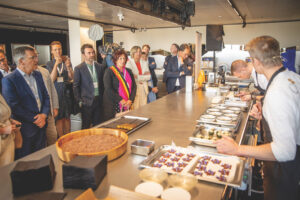
Famously, former US President Obama delivered a key speech when he visited Brussels back in 2014: “I have to admit, it is easy to love a country famous for chocolate and beer.” Few people are aware that Belgium is the world’s second biggest exporter of chocolate, shipping more than 700,000 tons of delicious treats in the last year alone.
Among its flagship companies is Barry Callebaut, which stands as the world’s largest manufacturer of chocolate and cocoa, with global production stemming from its major site in Wieze, that is thought to be the biggest of its kind in the world. (see new distribution facilities image below).
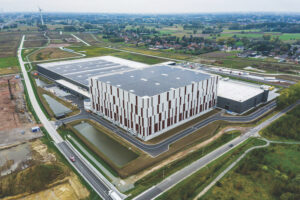
While its financial headquarters are in Zurich, it is of Belgian origin, with the Callebaut family, renowned for its brewing, expanded in 1911 when Octaaf Callebaut started a chocolate business. It is Callebaut that initiated the transport of liquid chocolate. This is often used as coating chocolate by professionals, richer in cocoa butter, melting more easily.
The other two major players in bulk chocolate production in Belgium are Belcolade belonging to Puratos and Cargill Chocolate. But in all, there are over 260 companies’ active in the chocolate sector, employing some 6,700 people, representing 8.7 per cent of the Belgian workforce in the food industry. The national annual production of bulk chocolate and cocoa based products reaches 584,000 tons, with 81,000 tons of white chocolate. The figures of retail chocolate products volumes sold, remain confidential, though have been estimated at a third of the bulk chocolate volume. This includes approximately 41,000 tons of pralines.
The industry turnover reaches €5 billion Euro (9.2 per cent of the Belgian food industry), among which more than half, €2.8 billion Euro go to export 21 per cent of the total exports leave for The Netherlands, France and Germany getting nearly 15 per cent, while 9 per cent goes to the UK. However, 43.5 per cent of cocoa and chocolate imported into Belgium comes from The Netherlands. This consists mainly of semi-finished cocoa products and candy bars.
A bunch of dynamic entrepreneurs
The chocolate market is undergoing significant shifts due to global trends such as health and well-being. Puratos’ Taste Tomorrow research shows that the number of consumers buying plant-based food has doubled since 2018 (from 35 per cent to 60 per cent). To answer this need, Belcolade, Puratos’ flagship chocolate brand has recently presented its plant-based alternative to milk chocolate. It is produced in the Belcolade factory in Erembodegem. “We know that the chocolate sector is driven by millions of milk chocolate lovers whose expectations were not sufficiently met in the search for plant-based alternatives.
The new product is designed to indulge these milk chocolate fans with an attractive, plant-based option. We are pleased and proud to finally be able to offer a delicious, allergen-free, plant-based chocolate,” says Youri Dumont, strategic business unit director chocolate at Puratos, which also produces ingredients right across the segment, including for bakery ranges.
Meanwhile, after it was sold in the seventies, the Meurisse brand name passed through the hands of different food companies, with varying degrees of success. Today, six generations down the line, it’s Henry who’s taking up the task to return Meurisse to its former grandeur. “It is a pioneer revival, I wanted to honour the craftsmanship of our ancestors.
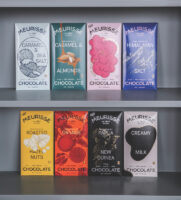
Revive successful ‘classic’ recipes, with fair trade ingredients and a smaller ecological footprint. That ethical and ecological aspect is crucial to our story. We’ll be selling Meurisse in the United States soon, which is very exciting. Other than that, our chocolate can also be tasted at various fairs, like the World Expo in Dubai,” confessed Henry Van Vyve, managing director at Meurisse. Winning the title of World Pastry Champion in France in 1995, Pierre Marcolini is a major actor of the Belgian chocolate scene.
Son of an Italian immigrant, he started modestly its first workshop in a 30m2 garage located in the suburbs of Brussels. Pierre Marcolini discovered the opportunity of roasting the cocoa bean himself and decided to “reappropriate his craft” by creating his own chocolate, “bean to bar”. Today, machines from the 1960s continue to operate in his 3,000m2 factory in Haren, where 230 tons of chocolates are made each year. Pierre Marcolini is an internationally recognised master pastry chef and chocolatier.
Notably, the business now employs 400 people worldwide, including 110 in the Brussels region, and has 40 boutiques in eight territories, including 10 in Japan, five in Paris and three in China. “Like wine, cocoa has its terroirs, its climates, its cocoa bean varieties, its crus. It tells the story of the jungle where it grew, of the know-how of the person who roasted it, who knew how to infuse it with its character and its soul”, revealed Pierre Marcolini. Created in 2005, small producer Belvas claims the title of first organic and Fairtrade chocolate factory in Europe. Many international prizes and recognitions have been awarded to Belvas and its founder Thierry Noesen.
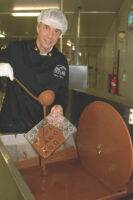
Since the early days, this quality chocolate was produced sustainably, was labelled “Max Havelaar”, guaranteeing fair wages to the producers of the raw materials. Strong advocate of fair income for the farmers, Belvas is putting it in practice with a recent joint venture with cacao producer in Africa. “In order to propagate organic and Fairtrade approach, we allow competing chocolate makers to visit our factory (50km from Brussels) and give them the names of our organic suppliers. Our turnover is increasing, growth is here, and it is important for us to say that it is part of a fair economy, with a fair price for the producers,” says Thierry Noesen, director of Belvas. In 2019, Salvatore Lannello took the helm of the Galler chocolate company.
He explains that he and his team aspire to a sustainable and fair world and this is reflected in the company’s commitments: from chocolate made from 100 per cent fair trade cocoa beans to worker empowerment. At Galler, everyone works humbly every day for a better world where the environment and people are at the centre.
The fact that the CEO was named CSR Professional of the Year is therefore notable. For its part, major brand Godiva owns 600 boutiques and a presence in more than 100 countries worldwide, and has grown into a global premium brand over the past 90 years. But before the global recognition, the business was and still is the story of an exceptional Belgian family whose passion for chocolate drove them to greatness.
Godiva is now jointly owned by Turkish conglomerate Yıldız Holding and South Korean Equity Company MBK Partners. Neuhaus claims to be the inventor of the praline. Another passionate chocolatier who handles top-quality ingredients with over 155 years of knowhow and craftsmanship. Their luxurious gift boxes are renowned.
Founded by Leonidas Kestekides in 1913, Leonidas is probably the most famous Belgian chocolatier in the world with more than 1,300 sales outlets spread over 40 countries in 5 continents. Every day, 10,000 people all over the world enjoy its products.
Significant achievements
Another major sector player for the region is Puratos, which is more than a hundred years old and produces a wide range of food ingredients. In 1988, it decided to settle a chocolate factory in its home country, Belgium. Over the years, the consumer’s demand for local and sustainable chocolate has increased substantially. International demand is rising: from the United States to the Middle-East and Asia.
Organic chocolate, chocolate with less sugar or with a higher cocoa content is reportedly doing very well. In November 2021, Puratos made a major investment to expand its factory and become world’s first carbon-neutral chocolate factory.
Belcolade, the chocolate division of Puratos, spent €120m in their production plant in Erembodegem, to expand its largest chocolate production factory. “Importantly, it will also be an “exemplar of sustainable chocolate production,” according to Jean-Philippe Michaux, CFO and head of the sustainability steering committee at Puratos. “We will nearly double our Belcolade output over the next five years, with customers benefitting from inspiring innovation brought to market faster than ever before“, states Youri Dumont, director of the chocolate business unit at Puratos. The investment of 120 million also creates numerous jobs. Furthermore, the staff of the factory is expected to grow by 100 employees.
The largest chocolate warehouse in the world
Remarkably, chocolate from Barry Callebaut is found in one out of five chocolate products in the world, with clients such as food giants Mondelēz (formerly Kraft General Foods, which owns Côte d’or, Cadbury, Milka or Lu), Nestlé or Unilever (Magnum, Ben & Jerry’s). So it is not surprising that storage needs to follow accordingly.
The firm’s new chocolate warehouse in Lokeren is the size of 12 football fields, 41 metres high and the largest and most sustainable in the world. Every day, 20 to 30 chocolate containers are loaded from Lokeren, ready to be transported all over the world. With a total investment of €100 million, this is Barry Callebaut’s largest investment ever in its logistics network. The construction of the warehouse started in the summer of 2019. Less than 24 months later, the building was completed. Solar panels and latest technologies were used for this fully automated bay of 41 metres high, that can store up to 125,000 pallets at a constant temperature of 18 °C. “The Chocolate Box“ as it is known is well located for road transport in Western Europe and has direct access to the port of Antwerp for worldwide shipments
The Beyond Chocolate initiative
Choprabisco, the association of the Belgian chocolate sector, and more than 60 other companies, retailers and NGO organisations joined the Beyond Chocolate initiative to make the Belgian chocolate sector more sustainable. “Beyond Chocolate has two ambitions: the first is that by 2025, all chocolate produced and/or traded in Belgium complies with one of the relevant certification standards (FairTrade, Rainforest Alliance, Organic) and/or is produced with cocoa products from company specific sustainability programmes.
By 2025, the agreements between the two main cocoa producing countries (Ivory Coast and Ghana) and the business community to combat deforestation (Cocoa & Forests Initiative) must also be respected. For the second ambition, the partners are committed to ensuring that cocoa farmers earn at least a minimum living income by 2030, and that further deforestation as a result of cocoa production for the Belgian chocolate sector is stopped,” explains Guy Gallet, secretary general of Choprabisco.
“Our The Beyond Chocolate secretariat calculated that in 2020, 57 per cent of the chocolate produced in Belgium was sustainable according to a certification standard or company specific sustainability program. The growing market demand for sustainable products is supporting to achieve these ambitions. Another significant progress is made for traceability of cocoa beans. Whereas in 2019 it was only 14 per cent, in 2020, 42 per cent of the cocoa used in the production of Belgian chocolate was traceable back to the cocoa farmer,” concludes Guy Gallet. “Life is like a box of chocolate. You never know what you’re going to get,” Forrest Gump once said. But little risk if they are Belgian chocolates.

